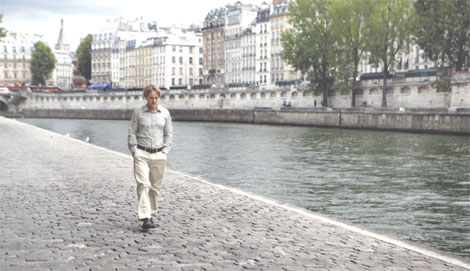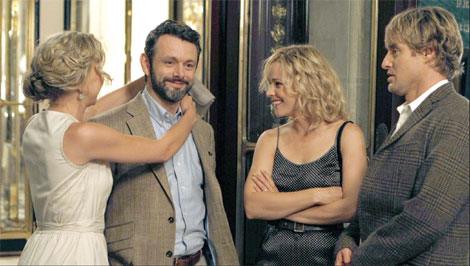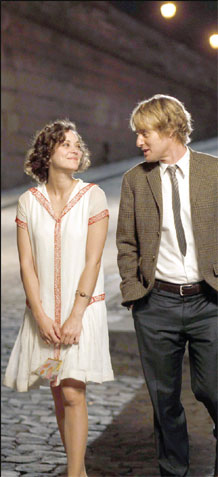Midnight madness
Updated: 2011-09-03 06:41
By Elizabeth Kerr(HK Edition)
|
|||||||||
|
It's a Woody Allen movie so there's a lot of walking, talking, and walking. Owen Wilson in Midnight in Paris. |
|
Gil (Owen Wilson, far right) grins and bears it as the insufferable Paul (Michael Sheen) bloviates on everything and nothing in Midnight in Paris. |
Woody Allen returns to Europe for a film only Woody Allen fans will be charmed by. Elizabeth Kerr reports.
Woody Allen's latest European flight of fancy, the time traveling romantic comedy Midnight in Paris, follows the alleged renaissance the intensely New York director is having. On the heels of the generally well received Match Point (set in London) and Vicky Cristina Barcelona (duh) comes Woody's fetishization of the City of Lights. In case you were wondering, he's in production on a film set and shot in Rome (The Bop Decameron, whatever that means). It seems no location in the old country is safe from Woody's neuroses and obnoxious alter egos.
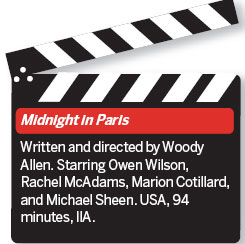
Midnight in Paris is Allen's biggest commercial hit in over 20 years and now reigns as his all time box office winner. The buzz coming off its premiere at Cannes in May was universally positive, if not downright fawning. Saying Midnight in Paris is only a so-so endeavor, with plenty of ridiculousness and irritating Woodyisms in it is akin to blasphemy - kind of like saying Harry Potter and the Deathly Hallows Part 2 just wasn't that strong a film. In the world of Woody sycophancy choosing Owen Wilson to take up the Allen avatar is "novel" casting, not "mis"-casting. The romanticization of Paris' lengthy artistic history is cleverly snarking at notions of what constitutes highbrow culture, not gleefully wallowing in them; heaven forbid you try to sit through the film without a crash course on World War I-era art history first. And as was the case with Allen's rendering of London and Barcelona, there's nary a ghetto or angry immigrant in sight.
Gil (Wilson) is a good-natured Hollywood hack (the "hack" part is Allen's so-called disguise), in Paris with his fiance Inez's (Rachel McAdams) parents. He's successful but has a hankering to write a novel - to be a "real" writer. Inez and her parents are dismissive at best, and Gil's obsession with the legacy of the Lost Generation gets on their nerves. While out strolling one night (there are lots of strolls along the Seine and through the city's cobbled arrondissements), as the clock strikes midnight, a vintage car rolls up, picks him up, and whisks him off to a party evidently raging in the 1920s. Cole Porter is playing the piano, Zelda and F. Scott Fitzgerald socialize, and Ernest Hemingway broods in the corner. Eventually he meets Adriana (Marion Cotillard), an artist's muse who he bonds with instantly. Meanwhile back in 2011, Inez is star struck by an arrogant Man Of The World, Paul (Michael Sheen), though she carries on with snobby wedding plans.
|
Yet another late-night stroll through the arrondissement of Paris sees temporally displaced Adriana (Marion Cotillard) falling for Gil (Owen Wilson) in Midnight in Paris. |
There are some interesting ideas lurking beneath the surface here, chiefly the power of nostalgia to cloud our perceptions and the cyclical nature of that nostalgic glow. How many times have you heard the phrase, "Popular music just isn't as good as it was in the '60s/'70s/'80s," lately? Give it some time. The '90s will have its turn soon. How about, "Movies are all special effects now"? Gil's rose-colored glasses perception of the fecund 1920s is mirrored by Adriana's view of the previous "great moment," the Belle poque. No doubt, there are Allen fans out there pining for the days of Annie Hall and Interiors. There's an understated melancholy for days gone by - in Paris and likely in Allen's native New York - that deserved more attention. The Paris that Gil is so fond of doesn't exist, as Inez reminds him time and again, and that sense of grand loss informs the narrative, giving it what little thematic heft it has. It even flirts with Allen acknowledging his own penchant for wistful backwards glances.
But Midnight in Paris is one part romantic comedy of sorts, though with Wilson in the lead it's only vaguely romantic, and with the exception of a few choice bit parts, rarely funny. Of the cabal of Lost Generation giants that make appearances in the film, Corey Stoll in a rip-roaringly macho, dour, and hilariously literary turn as Hemingway stands out, as does Kathy Bates as Gertrude Stein. Perhaps, though, the high point of the film comes courtesy Adrien Brody as Salvador Dali. The single scene in which the Spanish surrealist fixates on a rhinoceros is outr art comedy at its finest. This guy deserves a film of his own, just not one by Woody Allen.
As should be expected with an Allen film, the women characters leave a lot to be desired: Inez is ostensibly there to act as the foil that pushes Gil toward his destiny but to do so she had to be shrewish, shallow, and unsupportive. Inez has no redeeming qualities that would hint at why Gil went out with her a second time, never mind proposed marriage; Adriana's "job" is professional adoring girlfriend of artistic geniuses; a classy art gallery guide (Carla Bruni) is a tool for Gil to vindicate himself with; and a young antique dealer, Gabrielle (La Seydoux), proves to be the girl of his dreams when she repeats - word for word - Gil's feelings on Paris in the rain. The common bond between them? They're hot and they all desperately want Gil. This is only a few steps away from porn logic - which is at least honest about its male fantasy.
Like Match Point (Tate galleries at every turn and rolling countryside perfect for fox hunts) and Vicky Cristina Barcelona (fiery Spanish lovers sitting at charming cafs drinking wine), Midnight in Paris has a travelogue tone that never becomes to threatening, or steers too far from lushly photographed landmark set pieces (Look! The Eifel Tower! Again.). Whatever it is that has inspired Allen's diversion from what he knows best (Manhattan) remains a mystery, but after three major films it's clear Allen's brand of neurotic inertia doesn't transplant to Europe very well. Had Allen taken a stab at dismantling that perception of European laissez faire existentialism, he might have been on to something. But he didn't. Make your wagers now for how many shots the Colosseum will make it into - with excitable, hand-talking Italians walking by - in Allen's next European foray.
Midnight in Paris opens in Hong Kong on September 8.
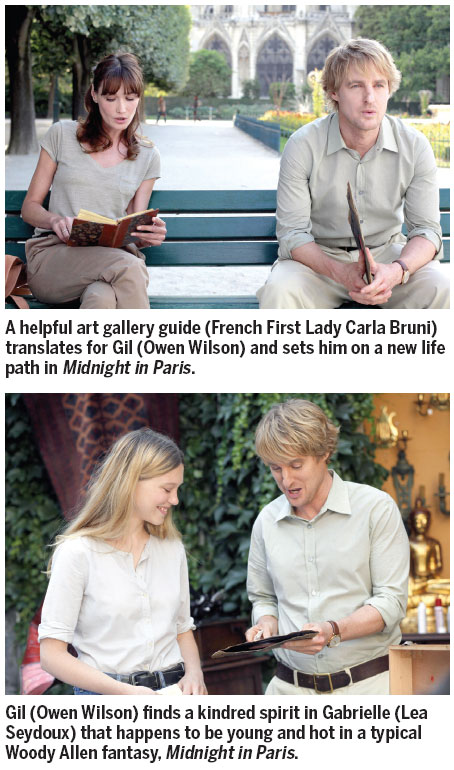
(HK Edition 09/03/2011 page4)
